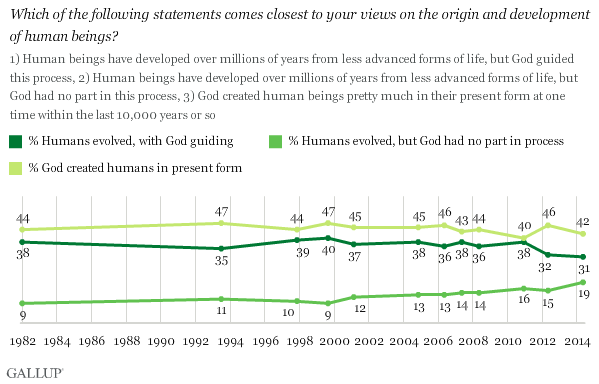I don't think you really listened, or you wouldn't feel that way.

That's not even a reasonable or logical request by the way. Macroevolution doesn't necessarily take place in a petri dish on a timeline of your choosing.
The 'hedging' aspect is typical in science. It demonstrates a potential for something to be falsified by later evidence. I can't see macroevolution take place on a short timeline, so in fact there is a certain amount of "faith' involved as you put it, but it's a reasonable thing to put faith in due to the lab work that supports it.
Omniscience? How so?
Quite the contrary. It shows that even simple changes to a few specific genes can generate macroscopic changes in an organism, just as we might expect if evolutionary theory is true. I find that people subjectively tend to dismiss evidence that they simply don't wish to deal with, or to acknowledge however.
That specific request wasn't reasonable to begin with by the way, and I didn't attempt to demonstrate it. What I did demonstrate however is that minor changes in genetic material an and does cause macroscopic changes in organisms, just as evolutionary theory would predict.
As I said, you're confusing ordinary conservative speech in science with some form of weakness. That's simply your own spin.
For how long? Unless you've got a few billion years of lab evidence to support that claim, it's still an ""act of faith" that nothing is ever going to change.
So what? The timelines of macroevolution are probably measured over millions of years, not a hundred years.
And that is exactly what evolutionary theory would predict by the way. The fact that a new type of organism can form, doesn't mean that *all* the organisms of the original sample will automatically go away, die out, or be completely replaced with the new organism. You do understand that, right?
Correct. That's why "real science" embraces evolutionary theory.

Actually science does that all the time. It's quite rare for actual scientists to treat theories as 'fact'. They tend to hedge their bets, and they tend to keep an open mind to the possibility of being wrong. Again, you're confusing ordinary scientific conservative use of speech with a weakness of some type. That's not how it actually works by the way.
What do you think I actually ignored? Even evolutionary theory *assumes* that some bacteria stay as ordinary bacteria, perhaps forever. There's nothing to ignore, and nothing that isn't 'predicted' by evolutionary theory in the observation that some bacteria stay the same over generations and hundreds of years. That's actually a *prediction* of evolutionary theory, and it's perfectly congruent with evolutionary theory.
Er, you could at least be consistent in your criticisms by the way. First you complain that the words they used are ambiguous, and not definite, and now you're accusing them of claiming it's "gawd's truth fact". Which is it? You can't have your cake and eat it too.
Actually it would bother me a whole lot more if they were using terms like 'definitely','absolutely' and 'certainly'. Science isn't supposed to be closed minded.
IMO you missed the whole point of the article. It simply shows that *relatively minor*, and/or very limited changes in DNA can and do generate *massive* changes to the organism.
You know......
A long time ago I gave up debating evolutionary theory mostly because it's 'doubters' tended to hide behind pure denial as it relates to evidence. I get that same impression from you at this point. I don't think you even cared about the content of the article, mostly because you failed to acknowledge the fact that relatively small changes in certain parts of the DNA structure can and do create significant changes in the form of extra legs, and major body changes. If you cannot accept that 'fact' (I'll use stronger terms for you if that makes you feel better), then there really isn't much to talk about.
It's silly of you to *require* something that isn't even a prediction of a theory. EV theory doesn't *predict* that bacteria need or will change over a 100 year timeline. That's your own personal pet peeve apparently but it's not a valid argument. Even evolutionary supporters would *predict* that bacteria will continue to thrive, and that it doesn't predict macroscopic changes over 100 year timelines.


